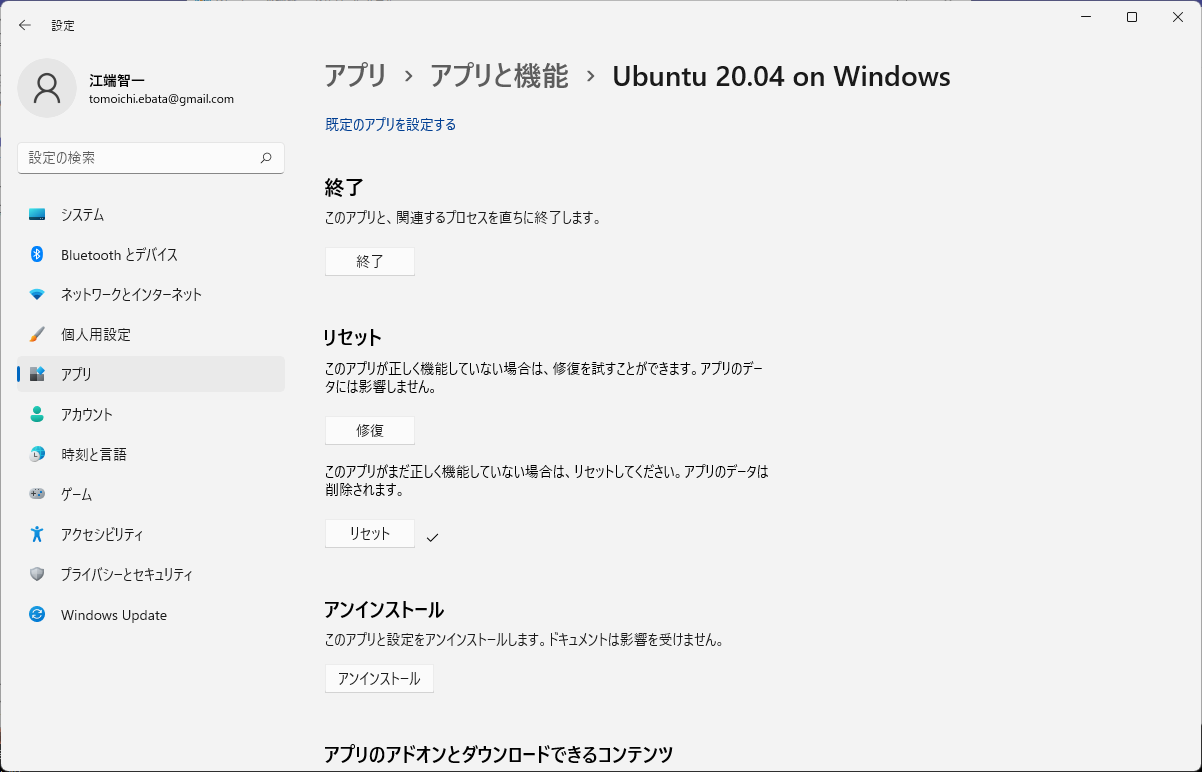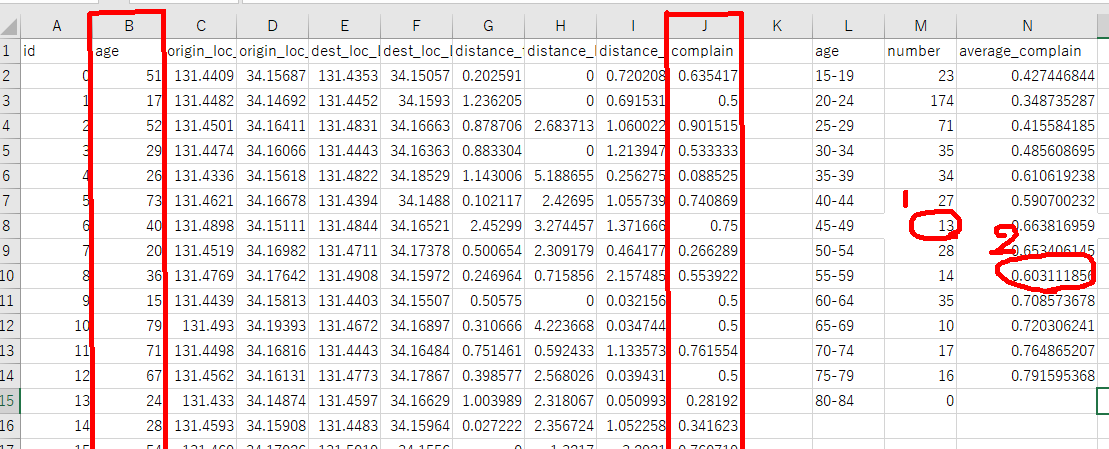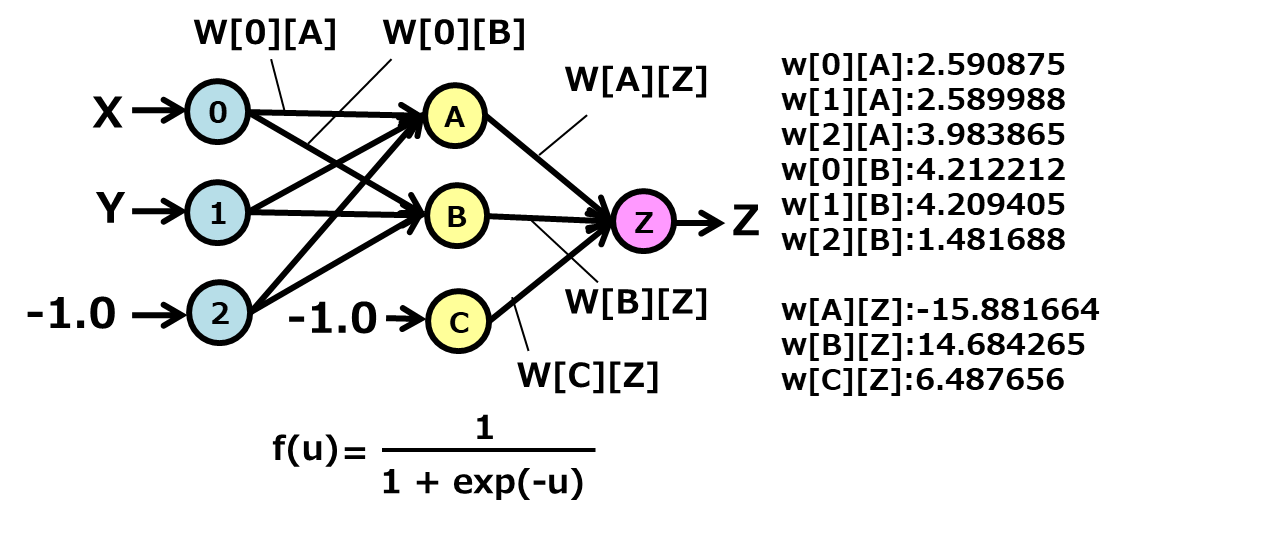リセットボタンでWSL2のUbuntu-20.04 をリセットできる

江端智一のホームページ
リセットボタンでWSL2のUbuntu-20.04 をリセットできる

https://development.relaxes.jp/windows11にwsl2+ubuntu20-04をインストールする/
これまで、VMWareやら、VirtualBoxやら、(Dockerも、)仮想環境というのは基本的に面倒くさい思い出ばかりなの(特に通信I/F回り)で、Windows10/11をインストールする時も、意図してWSLは弾いてきたのですが ―― そのツケが回ってきました。
Golangは、Windowsで実行するより、WSL on Windows10/11の方が実行速度が速い
という驚愕の情報をデータ付きで教えて頂き、現在、WSLの環境構築と、Golangのインストールを実行しています。
以外に簡単でしたし、通信I/F回りも今のところ、あまり問題になっていないようです。
さて、wslのインストールがコマンドプロンプトから、
>wsl -d Ubuntu-20.04
の環境を立ち上げて、
>sudo apt update
>sudo apt install golang-go
をしました。これでgolangは動くようになりました。
で、実際のプロウラムを動かしてみると、
# m/AgentSimulation
./db_util.go:280:24: undefined: sql.NullInt16
note: module requires Go 1.17
というエラーが出て止まります。
Go 1.17にモジュールが必要と言われているようですが、
$ go version
go version go1.13.8 linux/amd64
と出てきます。全然足りないようです。
ここからは、めんどくないGoのバージョンアップ を参考にして作業を進めました。
$sudo apt install golang-go
では、失敗するようです。
やっぱり
$sudo add-apt-repository ppa:longsleep/golang-backports
が重要なようでした。
定番の
$sudo apt autoremove$sudo apt update$sudo apt install$sudo apt upgrade
$sudo apt install golang-go
$ go version
go version go1.20.2 linux/amd64
現在時刻を入れた、agoopデータ形式のcsvファイルをGolangで作る
// C:\Users\ebata\yamaguchi\src_try2\others\main9.csv
/*
このデータ形式のcsvを作成する
Dailyid,Year,Month,Day,Hour,Minute,Second,Latitude,Longitude
14,2017,12,1,8,17,5,33.749583,132.709375
*/
package main
import (
"encoding/csv"
"fmt"
"log"
"os"
"time"
)
func main() {
const STATIONS_PATH string = "test.csv"
// csvファイル
csvFile, err := os.Create(STATIONS_PATH)
if err != nil {
log.Fatal(err)
}
defer csvFile.Close()
// CSVファイルの中身を読み込み
w := csv.NewWriter(csvFile)
//str := "Dailyid,Year,Day,Hour,Minute,Second,Latitude,Longitude"
str := []string{"Dailyid", "Year", "Day", "Hour", "Minute", "Second", "Latitude", "Longitude"}
fmt.Println(str)
if err = w.Write(str); err != nil {
log.Fatal(err)
}
/////
id := 1
dt := time.Now()
year := dt.Year()
day := dt.Day()
hour := dt.Hour()
minute := dt.Minute()
second := dt.Second()
latitude := 33.749583
longitude := 132.709375
str = []string{fmt.Sprint(id), fmt.Sprint(year), fmt.Sprint(day), fmt.Sprint(hour), fmt.Sprint(minute), fmt.Sprint(second), fmt.Sprint(latitude), fmt.Sprint(longitude)}
if err = w.Write(str); err != nil {
log.Fatal(err)
}
w.Flush() // バッファに残っているデータを書き込む
}
使う度に調べるので、メモしておきます。

1. 40歳から44歳の人の人数を数えろ
=COUNTIFS($B$1:$B$498, ">=45",$B$1:$B$498, "<50" )
2.55歳から59歳の人の不満値の平均値を求めよ
=AVERAGEIFS($J$1:$J$498, $B$1:$B$498, ">=55",$B$1:$B$498, "<60" )
Keywords: COUNTIF, COUNTIFS, AVERAGEIFS
This program is based on the following page
https://qiita.com/ufoo68/items/9e4ca04578ba0f5fa5ff

This program solves the XOR problem using MLP with one hidden layer.
#include <stdio.h>
#include <math.h>
#include <time.h>
#include <stdlib.h>
//num of units
#define NUM_INPUT 2
//#define NUM_HIDDEN 20
#define NUM_HIDDEN 2
double sigmoid(double x) {
return 1/(1+exp(-x));
}
//derivative of sigmoid function
double d_sigmoid(double x) {
double a = 0.1;
return a*x*(1-x);
}
int main(void) {
srand((unsigned)time(NULL));
//train data
double train_x[4][NUM_INPUT+1] = {{0, 0, -1},{0, 1, -1},{1, 0, -1},{1, 1, -1}};
double d[4] = {0, 1, 1, 0};
//net
double w[NUM_HIDDEN+1][NUM_INPUT+1];
double v[NUM_HIDDEN+1];
double y[4][NUM_HIDDEN+1];
double z[4];
double eta = 0.1;
int epoch = 1000000;
//other
int i, j, k, l;
double tmp = 0;
//update weights using rand()
for(l=0; l<NUM_HIDDEN+1; l++) {
for(i=0; i<NUM_INPUT+1; i++) {
w[l][i] = ((double)rand() / ((double)RAND_MAX + 1));
}
}
for(i=0; i<NUM_HIDDEN+1; i++) {
v[i] = ((double)rand() / ((double)RAND_MAX + 1));
}
//tain
for(k=0; k<epoch; k++) {
//feedforward
for(j=0; j<4; j++) {
//hidden
for(l=0; l<NUM_HIDDEN; l++) {
for(i=0; i<NUM_INPUT+1; i++) {
tmp += train_x[j][i] * w[l][i];
}
y[j][l] = sigmoid(tmp);
tmp = 0;
}
y[j][NUM_HIDDEN] = -1;
//output
for(i=0; i<NUM_HIDDEN+1; i++) {
tmp += y[j][i] * v[i];
}
z[j] = sigmoid(tmp);
tmp = 0;
//backward
//output
for(i=0; i<NUM_HIDDEN+1; i++) {
v[i] = v[i] - eta * y[j][i] * d_sigmoid(z[j]) * (z[j] - d[j]);
}
//hidden
for(l=0; l<NUM_INPUT+1; l++) {
for(i=0; i<NUM_HIDDEN+1; i++) {
w[i][l] = w[i][l] - eta * train_x[j][l] * d_sigmoid(y[j][i]) * d_sigmoid(z[j]) * (z[j] - d[j]) * v[i];
}
}
}
/*
//print detail
printf("z=");
for(i=0; i<4; i++) {
printf("%f ", z[i]);
}
printf("epoch:%d\n",k);
*/
}
//predict
for(j=0; j<4; j++) {
//hidden
for(l=0; l<NUM_HIDDEN; l++) {
for(i=0; i<NUM_INPUT+1; i++) {
tmp += train_x[j][i] * w[l][i];
}
y[j][l] = sigmoid(tmp);
tmp = 0;
}
y[j][NUM_HIDDEN] = -1;
//output
for(i=0; i<NUM_HIDDEN+1; i++) {
tmp += y[j][i] * v[i];
}
z[j] = sigmoid(tmp);
tmp = 0;
}
//print result
printf("z=");
for(i=0; i<4; i++) {
printf("%f ", z[i]);
}
printf("epoch:%d\n",k);
for(i=0; i<NUM_INPUT+1; i++) {
for(l=0; l<NUM_HIDDEN+1; l++) {
printf("w[%d][%d]:%f\n", i, l, w[i][l]);
}
}
for(i=0; i<NUM_HIDDEN+1; i++) {
printf("v[%d]:%f\n",i, v[i]);
}
return 0;
}
Save this program as a name "mlp.c", compile ">gcc mlp.c" and execute ">./a.exe"
Golang 文字列を数値に変換する方法で、文字列→実数なら、これが一番てっとり早そう
dest_lat, err := strconv.ParseFloat(row[2], 64)
strconv.ParseIntとstrconv.ParseUnitは、文字列を解析して整数型を返す関数
それぞれ符号付き整数型と符号なし整数型に対応している。
I hope you could understand the min-max method of Fuzzy reasoning, using the following Go programming list.
package main
import (
"fmt"
"os"
)
func max_2(a, b float64) float64 {
if a > b {
return a
} else {
return b
}
}
func min_2(a, b float64) float64 {
if a > b {
return b
} else {
return a
}
}
type condition_MF3 struct { // Base class for condition_MF3
center float64
width float64
express string
}
func new_condition_MF3(_center, _width float64, _express string) *condition_MF3 {
c3 := new(condition_MF3)
c3.center = _center
c3.width = _width
c3.express = _express
return c3
}
// Class for the membership function (3 mountains) of the former case
func (c3 *condition_MF3) func_X(_x float64) float64 {
// x,y denote coordinates on the membership function
x := _x
y := 0.0 // The value of y is always greater than or equal to 0 and less than or equal to 1
if c3.express == "LESS" {
if x <= c3.center-c3.width {
y = 1.0
} else if x <= c3.center {
y = -1.0 / c3.width * (x - c3.center)
} else {
y = 0.0
}
} else if c3.express == "COMMON" {
if x <= c3.center-c3.width {
y = 0.0
} else if x <= c3.center {
y = 1.0/c3.width*(x-c3.center) + 1.0
} else if x <= c3.center+c3.width {
y = -1.0/c3.width*(x-c3.center) + 1.0
} else {
y = 0.0
}
} else if c3.express == "MORE" {
if x <= c3.center {
y = 0.0
} else if x <= c3.center+c3.width {
y = 1.0 / c3.width * (x - c3.center)
} else {
y = 1.0
}
} else {
fmt.Println("MF3: wrong expression")
os.Exit(1)
}
return y
}
type condition_MF5 struct { // Base class for condition_MF5
center float64
width float64
express string
}
func new_condition_MF5(_center, _width float64, _express string) *condition_MF5 {
c5 := new(condition_MF5)
c5.center = _center
c5.width = _width
c5.express = _express
return c5
}
func (c5 *condition_MF5) func_X(_x float64) float64 {
// Class for the former membership function (5 mountains)
// x,y are the coordinates on the membership function
x := _x
y := 0.0 // The value of y is always greater than or equal to 0 and less than or equal to 1
if c5.express == "LESSLESS" {
if x <= c5.center-2.0*c5.width {
y = 1.0
} else if x <= c5.center-c5.width {
y = -1.0/c5.width*(x-(c5.center-2.0*c5.width)) + 1.0
} else {
y = 0.0
}
} else if c5.express == "LESS" {
if x <= c5.center-2.0*c5.width {
y = 0.0
} else if x <= c5.center-c5.width {
y = 1.0/c5.width*(x-(c5.center-c5.width)) + 1.0
} else if x <= c5.center {
y = -1.0/c5.width*(x-(c5.center-c5.width)) + 1.0
} else {
y = 0.0
}
} else if c5.express == "COMMON" {
if x <= c5.center-c5.width {
y = 0.0
} else if x <= c5.center {
y = 1.0/c5.width*(x-c5.center) + 1.0
} else if x <= c5.center+c5.width {
y = -1.0/c5.width*(x-c5.center) + 1.0
} else {
y = 0.0
}
} else if c5.express == "MORE" {
if x <= c5.center {
y = 0.0
} else if x <= c5.center+c5.width {
y = 1.0/c5.width*(x-(c5.center+c5.width)) + 1.0
} else if x <= c5.center+2.0*c5.width {
y = -1.0/c5.width*(x-(c5.center+c5.width)) + 1.0
} else {
y = 0.0
}
} else if c5.express == "MOREMORE" {
if x <= c5.center+c5.width {
y = 0.0
} else if x <= c5.center+2.0*c5.width {
y = 1.0/c5.width*(x-(c5.center+2.0*c5.width)) + 1.0
} else {
y = 1.0
}
} else {
fmt.Println("MF5 func_X(): wrong expression")
os.Exit(1)
}
return y
}
/////////////////////////////
type action_MF5 struct { // Base class for action_MF5
center float64
width float64
express string
x float64
y float64
}
type action_MF3 struct { // Base class for action_MF3
center float64
width float64
express string
x float64
y float64
}
func new_action_MF5(_center, _width float64, _express string) *action_MF5 {
a5 := new(action_MF5)
a5.center = _center
a5.width = _width
a5.express = _express
if a5.express == "LESSLESS" {
a5.x = a5.center - 2.0*a5.width
} else if a5.express == "LESS" {
a5.x = a5.center - a5.width
} else if a5.express == "COMMON" {
a5.x = a5.center
} else if a5.express == "MORE" {
a5.x = a5.center + a5.width
} else if a5.express == "MOREMORE" {
a5.x = a5.center + 2.0*a5.width
} else {
fmt.Println("new_action_MF5: wrong scale expression")
os.Exit(-1)
}
a5.y = 0.0
return a5
}
func new_action_MF3(_center, _width float64, _express string) *action_MF3 {
a3 := new(action_MF3)
a3.center = _center
a3.width = _width
a3.express = _express
if a3.express == "LESS" {
a3.x = a3.center - a3.width
} else if a3.express == "COMMON" {
a3.x = a3.center
} else if a3.express == "MORE" {
a3.x = a3.center + a3.width
} else {
fmt.Println("new_action_MF3: wrong scale expression")
os.Exit(-1)
}
a3.y = 0.0
return a3
}
// The latter membership function (5 mountains) class
func (a5 *action_MF5) func_Y() float64 {
return a5.y
}
// The latter membership function (3 mountains) class
func (a3 *action_MF3) func_Y() float64 {
return a3.y
}
func (a5 *action_MF5) func_Max(b float64) {
a5.y = max_2(b, a5.y)
}
func (a3 *action_MF3) func_Max(b float64) {
a3.y = max_2(b, a3.y)
}
func (a5 *action_MF5) func_X() float64 {
return a5.x
}
func (a3 *action_MF3) func_X() float64 {
return a3.x
}
func fuzzy_reasoning(temp, humi float64) float64 {
// Temperature(former)
Temp_Less := new_condition_MF3(20, 10, "LESS")
Temp_Common := new_condition_MF3(20, 10, "COMMON")
Temp_More := new_condition_MF3(20, 10, "MORE")
// Humidity(former)
Humi_Less := new_condition_MF3(50, 20, "LESS")
Humi_Common := new_condition_MF3(50, 20, "COMMON")
Humi_More := new_condition_MF3(50, 20, "MORE")
// Switch(前件部)
Switch_Less := new_action_MF3(0,1,"LESS")
Switch_Common := new_action_MF3(0,1,"COMMON")
Switch_More := new_action_MF3(0,1,"MORE")
// [Rule 01]
Rule01 := min_2(Temp_More.func_X(temp), Humi_More.func_X(humi))
Switch_Less.func_Max(Rule01) // the latters values are overwritten if the value is large enough.
fmt.Println("Rule01", Rule01)
// [Rule 02]
Rule02 := min_2(Temp_Common.func_X(temp), Humi_More.func_X(humi))
Switch_Common.func_Max(Rule02) // the latters values are overwritten if the value is large enough.
fmt.Println("Rule02", Rule02)
// [Rule 03]
Rule03 := min_2(Temp_More.func_X(temp), Humi_Common.func_X(humi))
Switch_Less.func_Max(Rule03) // the latters values are overwritten if the value is large enough.
fmt.Println("Rule03", Rule03)
// [Rule 04]
Rule04 := min_2(Temp_Less.func_X(temp), Humi_Less.func_X(humi))
Switch_More.func_Max(Rule04) // the latters values are overwritten if the value is large enough.
fmt.Println("Rule04", Rule04)
// Reasoning calculations
numerator :=
Switch_Less.func_X()*Switch_Less.func_Y() +
Switch_Common.func_X()*Switch_Common.func_Y() +
Switch_More.func_X()*Switch_More.func_Y()
denominator :=
Switch_Less.func_Y() +
Switch_Common.func_Y() +
Switch_More.func_Y()
reasoning := numerator / denominator
return reasoning
}
func main(){
fmt.Println(fuzzy_reasoning(27.0, 67.0))
}